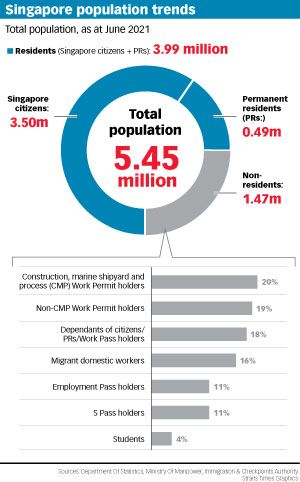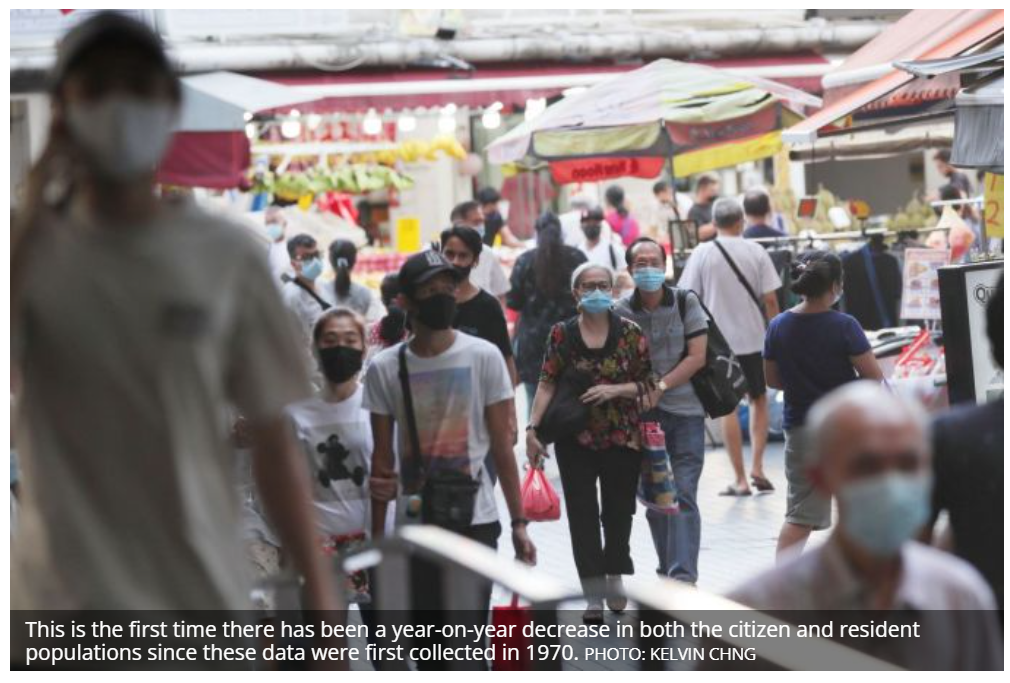Singapore’s population shrinks 4.1% y-o-y to 5.45m in June 2021 due to Covid-19
SINGAPORE’S population shrank 4.1 per cent between June 2020 and June 2021 to 5.45 million, largely due to the drop in non-residents during the Covid-19 pandemic, according to the annual Population in Brief 2021 report on Tuesday.
This is the first time there has been a year-on-year decrease in both the citizen and resident populations since these data were first collected in 1970.
It is also the largest decline in percentage terms and the third time the population has shrunk since 1950, according to data from the Department of Statistics. The previous two instances were in 1986 and 2003.
The Singapore citizen population dipped 0.7 per cent to 3.5 million as of June 2021, although this was on par with 2019 levels.
The citizen population has continued to age, with the proportion of those 65 and above at 17.6 per cent in June this year, compared with 16.8 per cent a year ago. Ten years ago, only 10.4 per cent of the population were in this age group.
The National Population and Talent Division (NPTD), a unit under the Prime Minister’s Office that published the report, is expecting the proportion to increase to 23.8 per cent by 2030.
Consequently, the median age of the citizen population continued inching up to 42.5 years as of June this year, compared with 42.2 years in the year-ago period. In June 2011, the figure was 39.1 years.
At the same time, the number of permanent residents (PR) fell by 6.2 per cent to 490,000 in the period from June 2020 to June 2021.
“This was mainly because more citizens and PRs remained overseas continuously for 12 months or more due to Covid-19 travel restrictions, and were therefore not counted as part of our population,” said NPTD.
Fewer citizenships and PRs were also granted last year, due to the Covid-19 pandemic, NPTD said.
In 2020, 21,085 individuals were granted citizenship, with the annual average being between 15,000 and 25,000. About 6 per cent of these were children born overseas to Singaporean parents.
While Singapore has been accepting about 30,000 new PRs a year since the tightening of the immigration framework in 2009, the number of individuals granted PR last year was 27,470.
The non-resident population shed 10.7 per cent and stood at 1.47 million, mainly because of a decrease in foreign employment over a period brought by travel restrictions and uncertain economic conditions, NPTD said.
Non-residents include foreign workers across all pass types, dependants and international students.
While all work pass categories saw decreases, the largest decline was in work permit holders in the construction, marine shipyard and process sectors, according to the report.

Meanwhile, there were 3.1 per cent fewer citizen births in 2020, a year that also saw total fertility rate drop to a historic low of 1.1.
There were 31,816 citizen births in 2020, down from 32,944 in the previous year and lower than the average of 32,500 between 2016 and 2020.
NPTD said this was also observed in other advanced societies such as the United States, Japan and Italy, and it could reflect the impact that uncertainties and health concerns arising from Covid-19 has had on parenthood decisions.
One way Singapore has tried to mitigate this is the Baby Support Grant, a S$3,000 cash grant given to parents of children born from Oct 1, 2020 to Sept 30, 2022.
There were also 12.3 per cent fewer citizen marriages at 19,430 in 2020, compared with 2019. This could be due to restrictions on large gatherings, NPTD said.
Among those who tied the knot in 2020, 30 per cent involved transnational couples, down from 37 per cent in 2019, a phenomenon the NPTD attributed to Covid-19-related travel restrictions.
Inter-ethnic marriages dipped slightly to 17 per cent in 2020, but this is on par with the proportions over the last 10 years of between 17 to 19 per cent.
Source: https://www.businesstimes.com.sg/government-economy/singapores-population-shrinks-41-y-o-y-to-545m-in-june-2021-due-to-covid-19


 Thailand
Thailand




